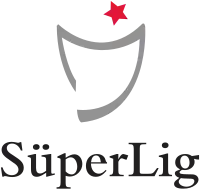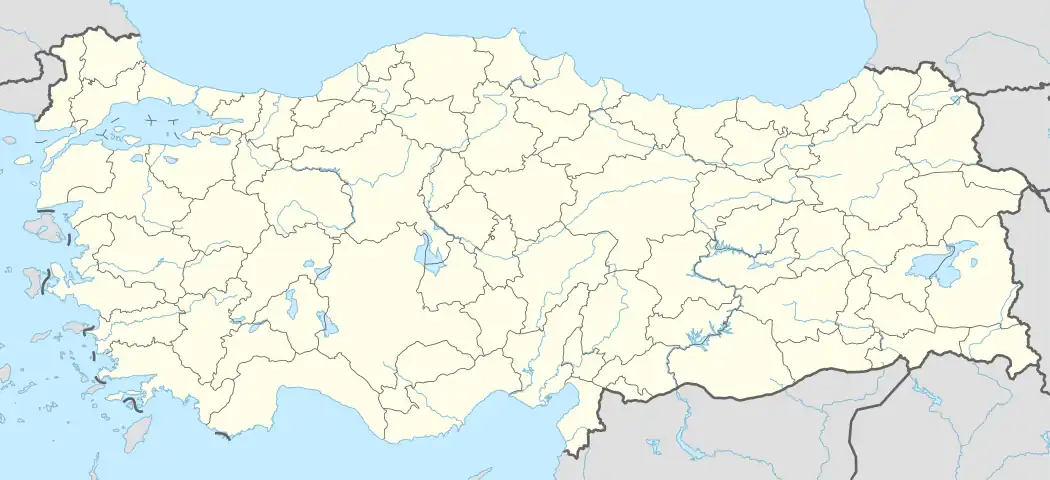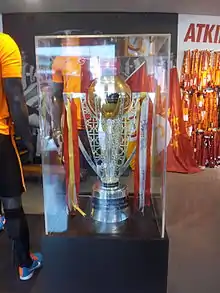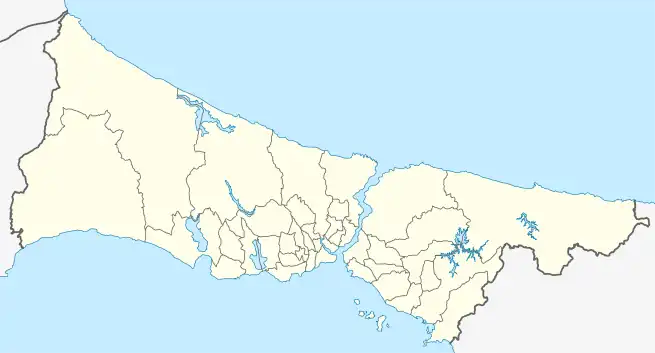Süper Lig
The Süper Lig (Turkish pronunciation: [ˈsypæɾ liɟ], Super League), officially known as Trendyol Süper Lig for sponsorship reasons,[3] is a Turkish professional league for association football clubs. It is the top-flight of the Turkish football league system and is run by the Turkish Football Federation. In the 2023-24 season, twenty clubs compete, where a champion is decided and three clubs are promoted from, and relegated to the 1. Lig. The season runs from August to May, with each club playing 38 matches. Matches are played Friday through Monday.
 | |
| Organising body | Turkish Football Federation (TFF) |
|---|---|
| Founded | 21 February 1959 |
| Country | Turkey |
| Confederation | UEFA |
| Number of teams | 20 |
| Level on pyramid | 1 |
| Relegation to | TFF First League |
| Domestic cup(s) | |
| International cup(s) | UEFA Champions League UEFA Europa League UEFA Europa Conference League |
| Current champions | Galatasaray (23rd title) (2022–23) |
| Most championships | Galatasaray (23rd title) |
| Most appearances | Umut Bulut (515)[1] |
| Top goalscorer | Hakan Şükür (249)[2] |
| TV partners | List of broadcasters |
| Website | tff.org |
| Current: 2023–24 Süper Lig | |
The league succeeded the Turkish Football Championship and the National Division, both being former top-level national competitions. The Süper Lig is currently 12th in the UEFA coefficient ranking of leagues based on club performances in European competitions over the last five years. A total of 75 clubs have competed in the Süper Lig, but only six have won the title to date: Galatasaray (23), Fenerbahçe (19), Beşiktaş (16), Trabzonspor (7), İstanbul Başakşehir (1) and Bursaspor (1).
History
Football in Turkey stems back to the late 19th century, when Englishmen brought the game with them while living in Salonica (then part of the Ottoman Empire).[4] The first league competition was the Istanbul Football League, which took place in the 1904–05 season. The league went through several variations until the creation of the Millî Lig (Süper Lig) in 1959. Between the creation of the Istanbul League and Millî Lig, several other regional leagues took place: Adana (1924), Ankara (1922), Eskişehir (1924), İzmir (1924), Bursa (1924), and Trabzon (1922), to name a few. The first competition to bring forth a national champion was the former Turkish Football Championship, which began in 1924 and continued until 1951.[5] The championship format was based on a knockout competition, contested between the winners of each of the country's top regional leagues.[6] The National Division (Turkish: Millî Küme) was the first national league competition in Turkey. Started in 1937, the National Division consisted of the strongest clubs from the Ankara, Istanbul, and İzmir leagues. The championship lasted until 1950.[7][8]
The Federation Cup was established in 1956 to decide a national champion. This champion would go on to participate in the European Cup. The competition was held for two seasons until it was replaced by the Millî Lig. Beşiktaş won both editions and qualified for the European Cup during the two-year span. However, since the TFF failed to register their name for the draw in time, Beşiktaş could not participate in the 1957–58 season after all.[9][10]
The top clubs of Ankara, Istanbul, and İzmir competed in the 1959 Turkish National League. The first season took place in the calendar year of 1959, instead of 1958-59, since the qualifying stages took place in 1958. The 16 clubs who competed in the first season were: Adalet (Istanbul), Altay (İzmir), Ankaragücü (Ankara), Ankara Demirspor (Ankara), Beşiktaş (Istanbul), Beykoz (Istanbul), Karagümrük (Istanbul), Fenerbahçe (Istanbul), Galatasaray (Istanbul), Gençlerbirliği (Ankara), Göztepe (İzmir), Hacettepe Gençlik (Ankara), İstanbulspor, İzmirspor, Karşıyaka (İzmir), and Vefa (Istanbul). The first champions were Fenerbahçe and the first "Gol Kralı" (top scorer) was Metin Oktay. No clubs were promoted or relegated at the end of the first season.[11]
The 2. Lig (Second League) was created at the start of the 1963–64 season and the Millî Lig became known as the 1.Lig (First League). Before the foundation of a second division, the bottom three clubs competed with regional league winners in a competition called the Baraj Games. The top three teams of the group were promoted to the Süper Lig. After the foundation of a new second division in 2001, known as the 1. Lig, the formerly titled 1. Lig was rebranded as Süper Lig.[12] The Süper Lig is home of the Fenerbahçe–Galatasaray derby, the most watched football game in Turkey. It is considered to be one of the best and most intense in the world, being ranked among the greatest football rivalries of all-time by various international sources.[13][14][15]
Format
There were 18 clubs in the Süper Lig until 2020. 20 Clubs are competing in the Süper Lig starting from 2020. During the course of the season (from August to May) each club plays the others twice (a double round robin system), once at their home stadium and once at that of their opponents, for a total of 38 games. Teams receive three points for a win and one point for a draw. No points are awarded for a loss. Teams are ranked by total points, then head-to-head record, then goal difference, and then goals scored. At the end of each season, the club with the most points is crowned champion. If points are equal, the head-to-head record and then goal difference determine the winner. The three lowest placed teams are relegated to the 1. Lig and the top two teams from the 1. Lig, together with the winner of play-offs involving the third to seventh placed 1. Lig clubs are promoted in their place.[16]
- 16 clubs: 1959
- 20 clubs: 1959–1962
- 22 clubs: 1962–1963
- 18 clubs: 1963–1964
- 16 clubs: 1964–1966
- 17 clubs: 1966–1968
- 16 clubs: 1968–1981
- 17 clubs: 1981–1982
- 18 clubs: 1982–1985
- 19 clubs: 1985–1987
- 20 clubs: 1987–1988
- 19 clubs: 1988–1989
- 18 clubs: 1989–1990
- 16 clubs: 1990–1994
- 18 clubs: 1994–2020
- 21 clubs: 2020–2021
- 20 clubs: 2021–2022
- 19 clubs: 2022–2023
- 20 clubs: 2023–present
Qualification for European competitions
The champions qualify for the second qualifying round of the Champions League. The runners-up, third place and the Turkish Cup winners qualify for the second qualifying round of the Europa Conference League. If the Turkish Cup winner has already qualified for European competition through their league finish, then the team that finishes fourth in the league takes their place.
UEFA ranking
As of June 7, 2023[17]
Süper Lig ranks 12th in UEFA Country Rankings 2023. The league made a big breakthrough in the early 90s and became one of the most valuable leagues in Europe. Süper Lig rose to 7th place in 2001 by achieving the best ranking in its history. In 1982, the league dropped to 28th place, achieving the worst ranking in its history.
| Ranking | Member association | Coefficient | |||||||
|---|---|---|---|---|---|---|---|---|---|
| 2022 | 2023 | Mvmt | 2018–19 | 2019–20 | 2020–21 | 2021–22 | 2022–23 | Total | |
| 11 | 11 | – | 6.000 | 6.000 | 5.500 | 9.500 | 5.375 | 32.375 | |
| 20 | 12 | 5.500 | 5.000 | 3.100 | 6.700 | 11.800 | 32.100 | ||
| 14 | 13 | 3.900 | 6.400 | 5.125 | 7.750 | 8.500 | 31.675 | ||
| 1960 | 1961 | 1962 | 1963 | 1964 | 1965 | 1966 | 1967 | 1968 | 1969 |
|---|---|---|---|---|---|---|---|---|---|
| 1970 | 1971 | 1972 | 1973 | 1974 | 1975 | 1976 | 1977 | 1978 | 1979 |
| 1980 | 1981 | 1982 | 1983 | 1984 | 1985 | 1986 | 1987 | 1988 | 1989 |
| 1990 | 1991 | 1992 | 1993 | 1994 | 1995 | 1996 | 1997 | 1998 | 1999 |
| 2000 | 2001 | 2002 | 2003 | 2004 | 2005 | 2006 | 2007 | 2008 | 2009 |
| 2010 | 2011 | 2012 | 2013 | 2014 | 2015 | 2016 | 2017 | 2018 | 2019 |
| 2020 | 2021 | 2022 | 2023 | ||||||
Clubs
Stadiums and locations

Champions
Only six clubs have been champions since the introduction of the Super League: Galatasaray 23 times, Fenerbahçe 19 times, Beşiktaş 16 times (see note below), Trabzonspor 7 times, and Bursaspor and İstanbul Başakşehir once each.
Teams in bold compete in the Süper Lig as of the 2023–24 season.
| Club | Champions[20] | Runners-up | Winning seasons | Runners-up seasons |
|---|---|---|---|---|
| Galatasaray |
23 | 13 | 1961–62, 1962–63, 1968–69, 1970–71, 1971–72, 1972–73, 1986–87, 1987–88, 1992–93, 1993–94, 1996–97, 1997–98, 1998–99, 1999–00, 2001–02, 2005–06, 2007–08, 2011–12, 2012–13, 2014–15, 2017–18, 2018–19, 2022–23 | 1956–571, 1957–581, 1959, 1960–61, 1965–66, 1974–75, 1978–79, 1985–86, 1990–91, 2000–01, 2002–03, 2013–14, 2020–21 |
| Fenerbahçe |
19 | 24 | 1959, 1960–61, 1963–64, 1964–65, 1967–68, 1969–70, 1973–74, 1974–75, 1977–78, 1982–83, 1984–85, 1988–89, 1995–96, 2000–01, 2003–04, 2004–05, 2006–07, 2010–11, 2013–14 | 1959–60, 1961–62, 1966–67, 1970–71, 1972–73, 1975–76, 1976–77, 1979–80, 1983–84, 1989–90, 1991–92, 1993–94, 1997–98, 2001–02, 2005–06, 2007–08, 2009–10, 2011–12, 2012–13, 2014–15, 2015–16, 2017–18, 2021–22, 2022–23 |
| Beşiktaş |
16 | 14 | 1956–571, 1957–581, 1959–60, 1965–66, 1966–67, 1981–82, 1985–86, 1989–90, 1990–91, 1991–92, 1994–95, 2002–03, 2008–09, 2015–16, 2016–17, 2020–21 | 1962–63, 1963–64, 1964–65, 1967–68, 1973–74, 1984–85, 1986–87, 1987–88, 1988–89, 1992–93, 1996–97, 1998–99, 1999–00, 2006–07 |
| Trabzonspor |
7 | 9 | 1975–76, 1976–77, 1978–79, 1979–80, 1980–81, 1983–84, 2021–22 | 1977–78, 1981–82, 1982–83, 1994–95, 1995–96, 2003–04, 2004–05, 2010–11, 2019–20 |
| İstanbul Başakşehir | 1 | 2 | 2019–20 | 2016–17, 2018–19 |
| Bursaspor | 1 | — | 2009–10 |
1 Beşiktaş formally requested that championships won in the 1956–57 and 1957–58 editions of the Turkish Federation Cup be counted as Turkish Professional First Division championships to the Turkish Football Federation. The Cup was established in 1956 to find a national champion to represent Turkey, after UEFA decided that only national champions could participate in the European Cup.[21] Beşiktaş had therefore earned the right to represent Turkey in the European Cup in the 1957–58 and 1958–59 seasons.[22] The ruling on this matter was announced in a press release on March 25, 2002 which indicated that the championships won by Beşiktaş in the Federation Cup would be counted as national league championships.
Star rating system
The honor of Golden Stars was introduced in football to recognize sides that have won multiple championships or other honours by the display of gold stars on their team badges and jerseys. In Turkey, clubs are permitted to place a golden star above their crest for every five national championships won. As of the 2023-24 season Galatasaray are permitted four golden stars, Fenerbahçe and Beşiktaş are permitted three golden stars, and Trabzonspor are permitted one golden star to be placed above their crest on their jerseys.
League participation
As of 2024, 75 clubs have participated. Note: The tallies below include up to the 2023–24 season. Teams denoted in bold are current participants.
- 66 seasons: Beşiktaş, Fenerbahçe, Galatasaray
- 54 seasons: MKE Ankaragücü
- 50 seasons: Bursaspor, Trabzonspor
- 48 seasons: Gençlerbirliği
- 42 seasons: Altay
- 31 seasons: Gaziantepspor,[23] Samsunspor
- 30 seasons: Eskişehirspor, Göztepe
- 28 seasons: Antalyaspor
- 25 seasons: İstanbulspor
- 23 seasons: Konyaspor
- 22 seasons: Adanaspor, Çaykur Rizespor
- 21 seasons: Denizlispor
- 20 seasons: Boluspor, Kocaelispor, Adana Demirspor, Kasımpaşa
- 19 seasons: Kayserispor
- 18 seasons: Sivasspor
- 16 seasons: Karşıyaka, İstanbul Başakşehir[24]
- 15 seasons:Mersin İdmanyurdu[25]
- 14 seasons: Vefa, Zonguldakspor[26]
- 13 seasons: Ankara Demirspor, Kayseri Erciyesspor,[27] Sarıyer
- 12 seasons: PTT[28]
- 11 seasons: Diyarbakırspor, Malatyaspor, Orduspor, Sakaryaspor
- 10 seasons: Altınordu, İzmirspor, Kardemir Karabükspor, Şekerspor,[29] Fatih Karagümrük
- 9 seasons: Ankaraspor, Feriköy
- 8 seasons: Beykozspor, Giresunspor, Hacettepe Gençlik,[30] Alanyaspor
- 7 seasons: Akhisarspor,[31]
- 6 seasons: Manisaspor
- 5 seasons: Vanspor,[32] Yeni Malatyaspor, Zeytinburnuspor , Gaziantep FK
- 4 seasons: Elazığspor, Hatayspor
- 3 seasons: Aydınspor, Bakırköyspor, Çanakkale Dardanelspor, Erzurumspor,[33]
- 2 seasons: Adalet,[34] Akçaabat Sebatspor,[35] Balıkesirspor, Beyoğluspor, Büyükşehir Belediye Erzurumspor,[36] Hacettepe, Yeşildirek, Yozgatspor[37]
- 1 season: Bucaspor,[38] Kahramanmaraşspor, MKE Kırıkkalespor, Petrolofisi,[39] Siirtspor,[40] Ümraniyespor, Pendikspor
Player records
Most goals
As of 15 May 2021 |
Most appearances
As of 15 May 2021
|
- Bold denotes players still active in the league.
- All players are Turkish unless otherwise indicated.
Turkish football clubs in UEFA competitions
| European Cup / UEFA Champions League | UEFA Cup / Europa League | UEFA Cup Winners' Cup | UEFA Super Cup | UEFA Intertoto Cup | ||||||
|---|---|---|---|---|---|---|---|---|---|---|
| Club | Semi-finalist | Quarter-finalist | Winner | Semi-finalist | Quarter-finalist | Quarter-finalist | Winner | Winner | Semi-finals | Quarter-finalist |
| Galatasaray | 1989 | 1963, 1970, 1994‡, 2001, 2013 | 2000 | - | - | 1992 | 2000 | - | - | - |
| Fenerbahçe | - | 2008 | - | 2013 | - | 1964 | - | - | - | - |
| Beşiktaş | - | 1987 | - | - | 2003, 2017 | - | - | - | - | - |
| Bursaspor | - | - | - | - | - | 1975 | - | - | - | 1995 |
| Göztepe | - | - | - | 1969# | - | 1970 | - | - | - | - |
| Kayserispor | - | - | - | - | - | - | - | 2006 | - | - |
| Trabzonspor | - | - | - | - | - | - | - | - | 1999 | - |
| Samsunspor | - | - | - | - | - | - | - | - | 1998 | - |
| İstanbulspor | - | - | - | - | - | - | - | - | 1997 | - |
‡ Galatasaray was one of the final eight teams of the 1993–94 UEFA Champions League group stage, however UEFA does not consider this a quarter-final participation.
# Inter–Cities Fairs Cup
Sponsorship
| Period | Sponsor | Brand |
|---|---|---|
| 1959–1963 | No sponsor | Millî Lig |
| 1963–2001 | 1. Lig | |
| 2001–2005 | Süper Lig | |
| 2005–2010 | Turkcell | Turkcell Süper Lig[42] |
| 2010–2017 | Spor Toto | Spor Toto Süper Lig[43] |
| 2017–2018 | No sponsor | Süper Lig |
| 2018–2019 | Spor Toto | Spor Toto Süper Lig[44] |
| 2019–2021 | No sponsor | Süper Lig |
| 2021–2023 | Spor Toto | Spor Toto Süper Lig[44] |
| 2023–present | Trendyol | Trendyol Süper Lig[3] |
Official match ball
- 2008–2010: Nike T90 Omni
- 2010–2011: Nike T90 Tracer
- 2011–2012: Nike Seitiro
- 2012–2013: Nike Maxim
- 2013–2014: Nike Incyte
- 2014–2015: Nike Ordem 2
- 2015–2016: Nike Ordem 3
- 2016–2017: Nike Ordem 4
- 2017–2018: Nike Ordem 5
- 2018–2020: Nike Merlin
- 2020–2021: Adidas Uniforia
- 2021–2022: Adidas Conext 21 Pro
- 2022–present: Puma Orbita
See also
References and notes
- "Türkiye Spor Toto Süper Lig". mackolik.com. Archived from the original on 19 February 2022. Retrieved 11 November 2015.
- "Hakan Şükür". Mackolik.com. Archived from the original on 22 July 2018. Retrieved 11 November 2015.
- "Süper Lig ve 1. Lig'in İsim Sponsoru Trendyol Oldu". tff.org (in Turkish). Turkish Football Federation. 12 July 2023. Archived from the original on 13 July 2023. Retrieved 13 July 2023.
- "Before the national Turkish Leagues". turkish-soccer.com. Erdinç Sivritepe. Archived from the original on 31 May 2018. Retrieved 27 May 2018.
- "Türkiye Futbol Federasyonu Kuruluyor". tff.org (in Turkish). Turkish Football Federation. Archived from the original on 14 April 2015. Retrieved 26 October 2017.
1936'ya kadar süren bu dönemde ilk Türkiye Şampiyonası Ankara'da yapılmış ve şampiyon Harbiye olmuştur.
- "Türkiye Futbol Birinciliği". Erdinç Sivritepe. Archived from the original on 20 January 2018. Retrieved 26 October 2017.
- "Türkiye Futbol Federasyonu Kuruluyor". tff.org (in Turkish). Turkish Football Federation. Archived from the original on 14 April 2015. Retrieved 26 October 2017.
...ilk deplasmanlı lig kapsamındaki Milli Küme maçları da yine bu dönemde tertip edilmiştir.
- "Milli Küme". Erdinç Sivritepe. Archived from the original on 5 July 2018. Retrieved 26 October 2017.
- Sivritepe, Erdinç Federation Cup 56/57 Archived 2017-04-08 at the Wayback Machine turkish-soccer.com, accessed 22 July 2010
- Sivritepe, Erdinç Federation Cup 57/58 Archived 2017-04-08 at the Wayback Machine turkish-soccer.com, accessed 22 July 2010
- Sivritepe, Erdinç 1959 Milli Lig Archived 2019-04-21 at the Wayback Machine turkish-soccer.com, accessed 22 July 2010
- Sivritepe, Erdinç 1963-1964 1. Lig Archived 2019-04-11 at the Wayback Machine turkish-soccer.com, accessed 22 July 2010
- "FourFourTwo's 50 Biggest Derbies in the World, No. 6: Fenerbahce vs Galatasaray". fourfourtwo.com. FourFourTwo. 29 April 2016. Archived from the original on 9 June 2020. Retrieved 11 May 2020.
- "The 50 greatest derbies in football throughout the world". givemesport.com. 14 April 2020. Archived from the original on 20 April 2020. Retrieved 11 May 2020.
- "History of the Istanbul Derby - Fenerbahce vs Galatasaray". sportskeeda.com. Archived from the original on 6 August 2020. Retrieved 11 May 2020.
- Official TFF competition rules Archived 2010-03-31 at the Wayback Machine
- "UEFA Country Ranking 2023". kassiesa.net. Archived from the original on 2020-12-15. Retrieved 2022-08-07.
- "UEFA Country Ranking 2023". kassiesa.net. Archived from the original on 2020-12-15. Retrieved 2023-07-17.
- @PendiksporK (July 19, 2023). "Önemli Duyuru" (Tweet) (in Turkish) – via Twitter.
- "Süper Lig Şampiyonu Takımlar". www.tff.org (in Turkish). Turkish Football Federation. Archived from the original on 22 November 2015. Retrieved 15 February 2018.
- "Turkey – List of Champions". RSSSF. Rec.Sport.Soccer Statistics Foundation. 23 May 2019. Archived from the original on 25 May 2019. Retrieved 25 May 2019.
- "Türkiye Futbol Federasyonu Ana Sayfa TFF". www.tff.org. Archived from the original on 2013-05-03. Retrieved 2016-05-16.
- Dissolved in 2020.
- Played as İstanbul Büyükşehir Belediyespor before 2014-15 season.
- Later renamed as Mersin Talim Yurdu. Dissolved in 2019.
- Later renamed as Fenerspor. Dissolved in 2012. - Zonguldakspor Archived 2011-07-28 at the Wayback Machine
- Played as Kayserispor before 2005-06 season. Dissolved in 2018.
- Later renamed as Türk Telekom. Dissolved in 2011.
- Later renamed as Turanspor. Dissolved in 2017.
- Ankara Keçiörengüçü since 1988.
- Played as Akhisar Belediyespor before 2017-18 season.
- Later renamed as İl Özel İdaresi Vanspor. Dissolved in 2014.
- Dissolved in 2015.
- Alibeyköyspor since 1971.
- Dissolved in 2018.
- Erzurumspor FK since 2022.
- Later renamed as Yozgatspor Ticaret. Dissolved in 2015.
- Later renamed as Buca Geliştirmespor. Dissolved in 2020.
- Dissolved in 2010. (TFF Archived 2018-04-07 at the Wayback Machine)
- Later renamed as Siirt Yeni Köy Hizmetleri. Dissolved in 2020. Siirtspor Archived 2011-07-08 at the Wayback Machine
- "Türkiye Spor Toto Süper Lig". mackolik.com. Archived from the original on 18 June 2016. Retrieved 11 November 2015.
- "Süper Lig, 50 milyon dolara 'Turkcell'in". hurriyet.com.tr (in Turkish). Hürriyet. 12 August 2005. Archived from the original on 13 July 2023. Retrieved 13 July 2023.
- "Spor Toto ile Süper Lig isim sponsorluğu anlaşması imzalandı". tff.org (in Turkish). Turkish Football Federation. 12 August 2010. Archived from the original on 13 July 2023. Retrieved 13 July 2023.
- "Süper Lig Tarihçe". tff.org (in Turkish). Turkish Football Federation. Archived from the original on 25 July 2019. Retrieved 13 July 2023.
External links
- Official website – Süper Lig (in Turkish)
- Official website – Turkish Football Federation (in Turkish)
- Süper Lig on Twitter


